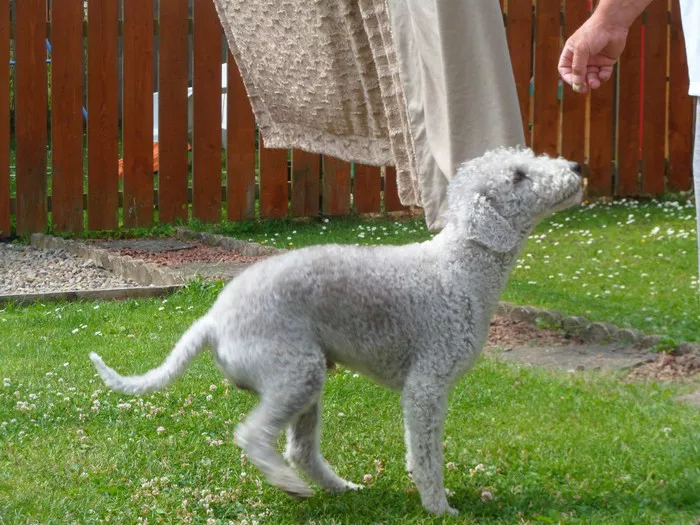The Bedlington Terrier, with its unique lamb-like appearance, is a breed known for its gentle demeanor and lively personality. These dogs, originally bred for hunting vermin in the mining towns of Northumberland, England, are now popular pets and show dogs. Their intelligence and keen sense of curiosity make them engaging companions, but how do these traits translate into trainability?
Intelligence and Trainability
Intelligence is a crucial factor when it comes to training any dog, and Bedlington Terriers are no exception. These terriers are known for their sharp minds and problem-solving abilities. They quickly grasp new commands and enjoy the mental stimulation that training provides. This intelligence makes them responsive to training, but it also means they can become bored with repetitive tasks. To keep a Bedlington Terrier engaged, training sessions should be varied and challenging.
The Importance of Early Socialization
Socialization is essential for any dog breed, but it is particularly important for Bedlington Terriers. Early socialization helps them become well-rounded adults who are comfortable in various situations. Exposing them to different people, animals, and environments from a young age will prevent them from becoming shy or overly protective. Puppy classes, playdates, and visits to different places are great ways to ensure a Bedlington Terrier develops into a confident and sociable dog.
Positive Reinforcement Techniques
Positive reinforcement is the most effective training method for Bedlington Terriers. This breed responds well to praise, treats, and affection. Using these rewards to reinforce good behavior will encourage the dog to repeat the desired actions. Harsh training methods or punishment can lead to fear and anxiety, which are counterproductive to the training process. Instead, focus on rewarding positive behaviors and redirecting unwanted ones.
Common Training Challenges
Despite their intelligence, Bedlington Terriers can present certain training challenges. Their independent nature, a trait common in terriers, can sometimes be mistaken for stubbornness. They have a strong prey drive, which can make recall training difficult if they are distracted by small animals. Consistency and patience are key to overcoming these challenges. Regular training sessions, using high-value rewards, and gradually increasing the level of distraction can help in managing these issues.
House Training a Bedlington Terrier
House training is often one of the first challenges new dog owners face. Bedlington Terriers, like all dogs, need a consistent routine to understand where and when they should eliminate. Crate training can be a useful tool in this process, as it leverages the dog’s natural instinct to keep their sleeping area clean. Frequent trips outside, especially after meals and naps, along with positive reinforcement when they eliminate in the right spot, will expedite the house training process.
Obedience Training Basics
Basic obedience training is crucial for all dogs, providing them with the foundation to become well-mannered pets. Teaching commands such as “sit,” “stay,” “come,” and “leave it” not only makes daily life easier but also ensures the dog’s safety. Bedlington Terriers, with their quick learning ability, can master these basic commands relatively quickly with consistent training. Short, frequent training sessions are more effective than long, infrequent ones, as they keep the dog engaged and focused.
Advanced Training and Activities
Once a Bedlington Terrier has mastered basic obedience, they can move on to more advanced training and activities. These dogs excel in agility, obedience competitions, and even scent work due to their keen noses and agile bodies. These activities provide mental and physical stimulation, preventing boredom and promoting overall well-being. Engaging a Bedlington Terrier in these advanced activities can also strengthen the bond between dog and owner.
Social Skills and Play
Bedlington Terriers are known for their playful nature. Incorporating play into training sessions can make learning more enjoyable for them. Interactive toys, puzzle games, and fetch can be used as rewards during training. Additionally, playtime with other dogs helps Bedlington Terriers develop social skills. Ensuring they have positive interactions with other dogs will prevent behavioral issues such as aggression or fearfulness.
Handling and Grooming Training
Grooming is an essential part of caring for a Bedlington Terrier, as their unique coat requires regular maintenance. Training them to accept handling from a young age will make grooming sessions easier and more pleasant for both the dog and the owner. Teaching commands like “stand,” “stay,” and “down” can help during grooming. Positive reinforcement should be used to reward calm behavior during brushing, bathing, and nail trimming.
Health and Veterinary Care
Regular veterinary care is crucial for maintaining a Bedlington Terrier’s health. Training them to be comfortable with handling by veterinarians will make visits less stressful. Teaching commands such as “hold” and “stay” can be beneficial during examinations. Additionally, ensuring they are accustomed to having their ears, teeth, and paws checked will make routine health checks smoother.
Dealing with Behavioral Issues
Behavioral issues can arise in any breed, and Bedlington Terriers are no exception. Common issues include separation anxiety, excessive barking, and digging. Understanding the root cause of these behaviors is the first step in addressing them. Providing plenty of physical and mental stimulation, ensuring they are not left alone for long periods, and using positive reinforcement to redirect unwanted behaviors can help mitigate these issues.
Training Resources and Support
For those new to dog training or encountering difficulties, seeking professional help can be beneficial. Professional dog trainers, particularly those who use positive reinforcement methods, can provide guidance and support. Books, online courses, and local training classes are also valuable resources. Engaging with a community of Bedlington Terrier owners can provide insights and tips specific to the breed.
See also: How Hard Is It to Train an Australian Shepherd?
Conclusion
Training a Bedlington Terrier can be a rewarding experience due to their intelligence and eagerness to learn. Early socialization, consistent training, and positive reinforcement are key to raising a well-behaved and happy Bedlington Terrier. While they may present some challenges, particularly with their independent nature and prey drive, patience and perseverance will yield positive results. With the right approach, Bedlington Terriers can become well-mannered companions and excel in various activities and competitions.


